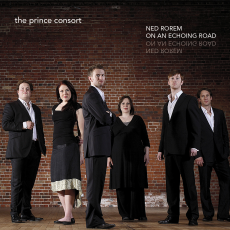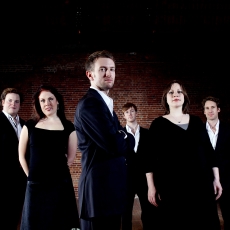The Prince Consort - Ned Rorem (Live) - MusicOMH
Far away from the Mothering Sunday and St Patrick's Parade revellers, the Wigmore Hall was yet again a welcome oasis of calm in the middle of London.
Inside, a disappointingly small audience had gathered for a recital of songs by Ned Rorem, described as 'the world's best composer of art songs'.
The Prince Consort is a six-strong ensemble (five singers plus artistic director and pianist Alisdair Hogarth) of former Royal College of Music students whose recent recording of Rorem songs has won much praise. Jacques Imbrailo's rich, warm baritone launched into one of the composer's most endearing songs, 'Early in the morning', a disarmingly simple snapshot of a city street scene, followed by a sparse, Britten-esque setting of the ever enduring 'Jeanie with the light brown hair'.
A strand running through the recital was the inclusion of items from Rorem's extended song cycle Evidence of Things Not Seen (the European première of which was given by the Prince Consort) in between the sets performed by each singer. Written for varying vocal combinations, these demonstrated Rorem's uncanny feel for the human voice, from the striking harmonies of the unaccompanied writing in 'Requiescat' and 'Hymn for Evening' to the sensual intertwining of the voices in 'On an echoing road', exquisitely sung by soprano Anna Leese and counter-tenor Tim Mead.
For those unsure about counter-tenors singing art song, listen to Mead and I bet you'll be won over. Clear and even throughout his register, his gentle and charming 'Rain in spring' was my favourite moment of the recital, while he found a suitably enigmatic tone for 'O do not love too long', a Yeats setting.
At the heart of the concert lay a special commission from Rorem, a setting of Shakespeare's Sonnet 144 ('Two loves I have of comfort and despair ...') for soprano and mezzo-soprano. Leese and Jennifer Johnston wonderfully showed the almost comic tussle between good and evil, before combining to convey the darker message of the final lines. Both women also contributed strong sets of their own: Leese's simple reading of the Barber-hued 'Little elegy' was nicely offset by the mesmerizing 'To a young girl', while Johnston was particularly beguiling in 'I will always love you', charting the slow and reluctant fading of young, enthusiastic love.
The final soloist of the evening was Andrew Staples, whose clear tenor and nonchalant delivery had the audience in giggles all the way through 'The serpent'. A moving setting of Catullus's funeral ode for his brother was followed by the earliest song in the recital, an exultant setting of 'Alleluia' which showed characterization aplenty, as well as a ringing top B to finish.
Staples called the encore, 'On a singing girl', a 'perfect distillation down to the essence of Rorem', but that description could have applied to each and every one of the songs that preceded it.
Far away from the Mothering Sunday and St Patrick's Parade revellers, the Wigmore Hall was yet again a welcome oasis of calm in the middle of London.
Inside, a disappointingly small audience had gathered for a recital of songs by Ned Rorem, described as 'the world's best composer of art songs'.
The Prince Consort is a six-strong ensemble (five singers plus artistic director and pianist Alisdair Hogarth) of former Royal College of Music students whose recent recording of Rorem songs has won much praise. Jacques Imbrailo's rich, warm baritone launched into one of the composer's most endearing songs, 'Early in the morning', a disarmingly simple snapshot of a city street scene, followed by a sparse, Britten-esque setting of the ever enduring 'Jeanie with the light brown hair'.
A strand running through the recital was the inclusion of items from Rorem's extended song cycle Evidence of Things Not Seen (the European première of which was given by the Prince Consort) in between the sets performed by each singer. Written for varying vocal combinations, these demonstrated Rorem's uncanny feel for the human voice, from the striking harmonies of the unaccompanied writing in 'Requiescat' and 'Hymn for Evening' to the sensual intertwining of the voices in 'On an echoing road', exquisitely sung by soprano Anna Leese and counter-tenor Tim Mead.
For those unsure about counter-tenors singing art song, listen to Mead and I bet you'll be won over. Clear and even throughout his register, his gentle and charming 'Rain in spring' was my favourite moment of the recital, while he found a suitably enigmatic tone for 'O do not love too long', a Yeats setting.
At the heart of the concert lay a special commission from Rorem, a setting of Shakespeare's Sonnet 144 ('Two loves I have of comfort and despair ...') for soprano and mezzo-soprano. Leese and Jennifer Johnston wonderfully showed the almost comic tussle between good and evil, before combining to convey the darker message of the final lines. Both women also contributed strong sets of their own: Leese's simple reading of the Barber-hued 'Little elegy' was nicely offset by the mesmerizing 'To a young girl', while Johnston was particularly beguiling in 'I will always love you', charting the slow and reluctant fading of young, enthusiastic love.
The final soloist of the evening was Andrew Staples, whose clear tenor and nonchalant delivery had the audience in giggles all the way through 'The serpent'. A moving setting of Catullus's funeral ode for his brother was followed by the earliest song in the recital, an exultant setting of 'Alleluia' which showed characterization aplenty, as well as a ringing top B to finish.
Staples called the encore, 'On a singing girl', a 'perfect distillation down to the essence of Rorem', but that description could have applied to each and every one of the songs that preceded it. I bought the Prince Consort's CD immediately after the concert, and I heartily urge you all to do the same.

